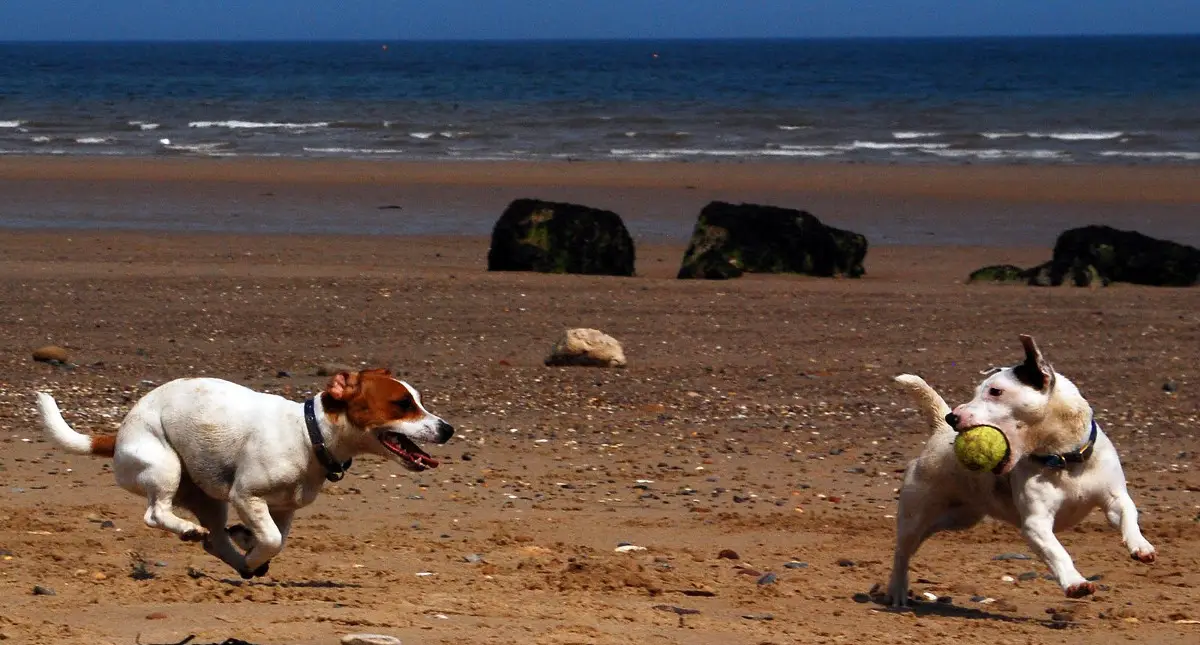Table of Contents
*This post may contain affiliate links. As an Amazon Associate we earn from qualifying purchases.
Our dogs are cute, loving, and fun to be around. But they can do some inexplicably weird things — and a lot of things we wish they wouldn’t.
At some point, every dog owner will find themselves asking why? Why does my dog do that? Not only
Are your Jack Russell’s antics adorable? Or are they driving you nuts?
Either way, what can you do?
Answers? We’ve got ’em.
Things We Like
When people talk about dog behaviors, often they mean problem behaviors. But the Jack Russell has quite a few endearing habits as well.
What are they?
Check this out.
That head tilt
Does your Jack Russell tip his or her head to one side when you talk to them? Or maybe when they hear an unfamiliar sound? It’s cute as heck, no denying it. But why do they do it?
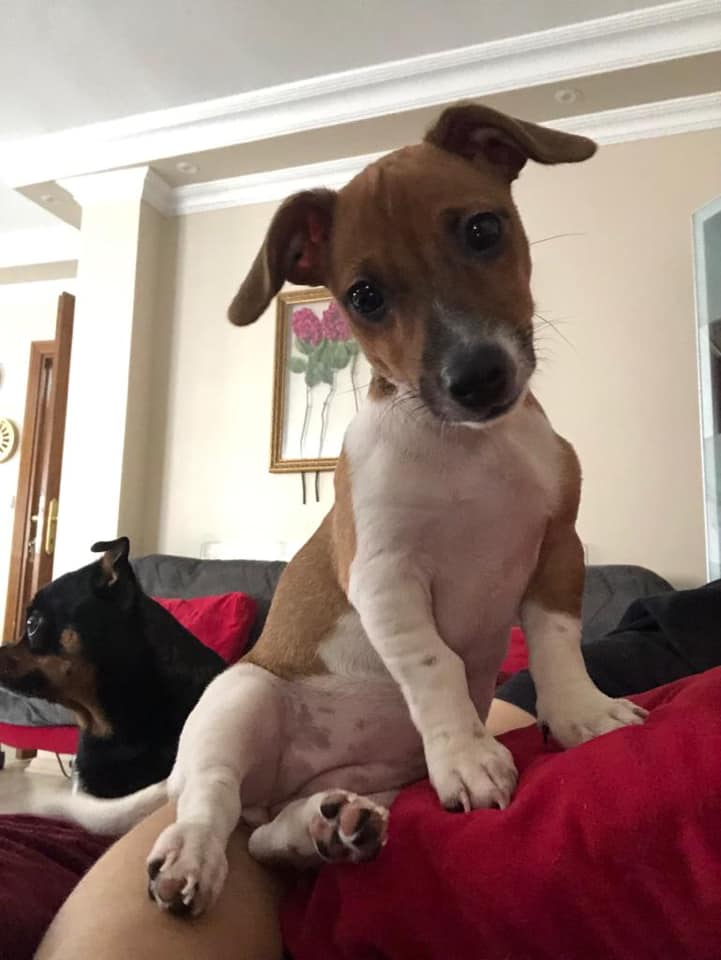
Most often, they’re just trying to get a better understanding of what they’re hearing. And if you’re speaking, it means they’re listening, and really paying attention!
It’s important to note, though, that a persistent head tilt can be the sign of a physical problem, like inner ear polyps, head trauma, or an infection. It can be like vertigo in people.

So if your pup keeps tilting their head and has other symptoms like a stumbling “drunken” walk or involuntary eye movements, it’s time to get to the vet, stat.
Smiling
A lot of Jack Russells have a winning smile. And it looks just like a human one: eyes bright, mouth relaxed and lips turning upward at the edges.
But is a smile really a smile?
According to science, yes!
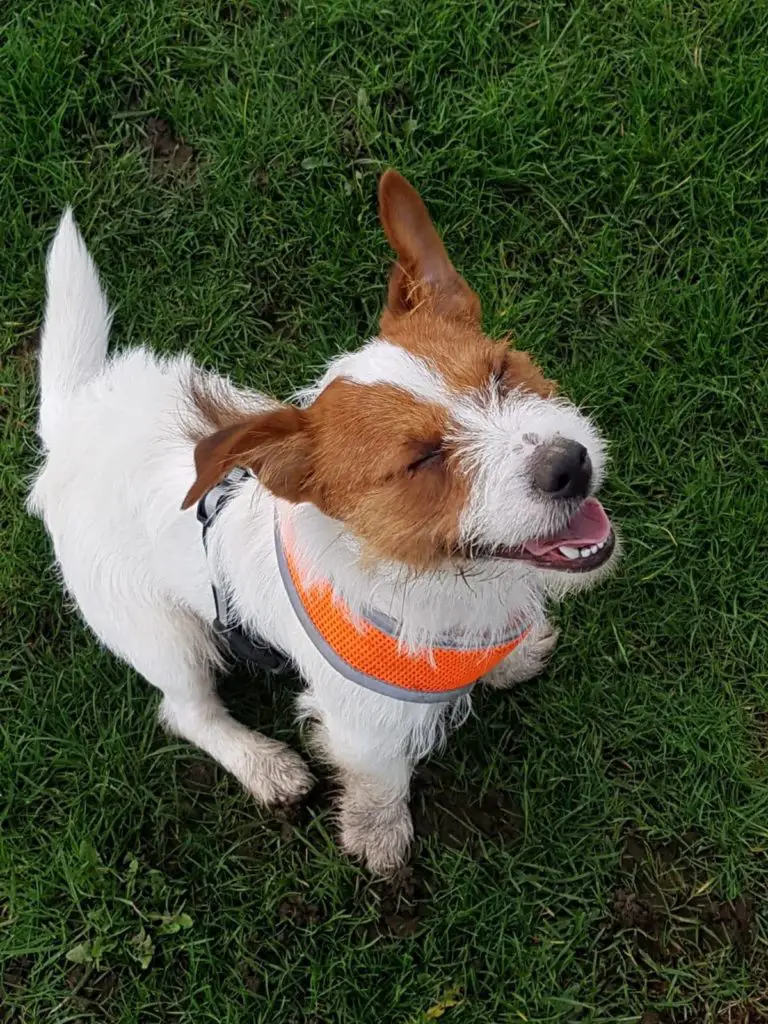
In 2012, a group of neuroscientists gathered at the University of Cambridge in England to get to the bottom of a question to which pet owners have known the answer for centuries. Do animals have emotional lives?
The answer — duh — is that yes, they do. Not only that, but they experience a similar range and type of emotions as humans do.
What does that have to do with smiling?

Well, according to the ASPCA, a happy dog has relaxed body language. Specifically, a content dog may relax its facial muscles to the point that those muscles will slide back along the dog’s face and look like a smile.
So, yes, dogs do feel happiness. And sometimes, when it looks like your Jack is smiling, it’s because they are.
Frapping
Ok, some people find this cute, and other people find it crazy making. But what the heck is it?
F.R.A.P. is an acronym. It stands for “frenetic random activity pattern.” In a nutshell it means running around like a maniac for no apparent reason.
It can be adorable. It can also be exhausting to watch. This Jack is frapping like it’s his job.
Good thing there’s a cure, and everyone who loves a JRT already knows what we’re going to say. Go outside. Throw that ball. Have a walk. Chase that stick.
To say that
So, what are you waiting for?
Howling
This is another behavior that some people like and others don’t.
Does your Jack Russell howl? When does it happen? Why do you think that is? Can you get them to howl on cue?

By and large, howling is a social behavior. It’s a way that wolves and dogs communicate with members of the pack who aren’t there. Sometimes, if you’re with your family — that is, your pack — you can get a group howl going, and your dog will join in. It’s fun!
This Jack howls, for example, when someone asks them about an absent family member.
Dogs also howl out of excitement or a feeling of achievement. If your dog howls when you’re not there, they may be calling you to tell you all about it. Or maybe they’re doing a victory howl and want you to know they’ve been a good boy or girl.
But if your dog never howled before and suddenly starts, pay attention. Howling can also be a sign that your dog is in pain. Dogs with separation anxiety may also howl.
So however you feel about a good howl, always keep your eyes open and respond to signs of stress or pain.
Things We Could Do Without
In addition to the cute, there’s also the annoying. And the destructive. And the just plain gross.
But understanding the reasons for problem behaviors can help you to solve them. Or if not to solve them, then at least to understand why.
Digging
A lot of dogs dig. But few do it with the energy, the enthusiasm, and the dogged determination of a Jack Russell Terrier.
But why do they act like they’re expecting to find treasure in your flower beds?
Turns out, digging is classic, A-1 terrier behavior.

They may dig up your flowers. Or your lawn. Your dog may dig under the fence. But why? Why? Why?
There are several reasons.
First, the Jack Russell Terrier was bred to chase prey to
So if your Jack is digging, it could be that he or she smells an animal underground and wants to get it.
Some dogs also dig when they’re bored. Others are escape artists, looking for adventure. Destructive digging could also be a sign of anxiety.
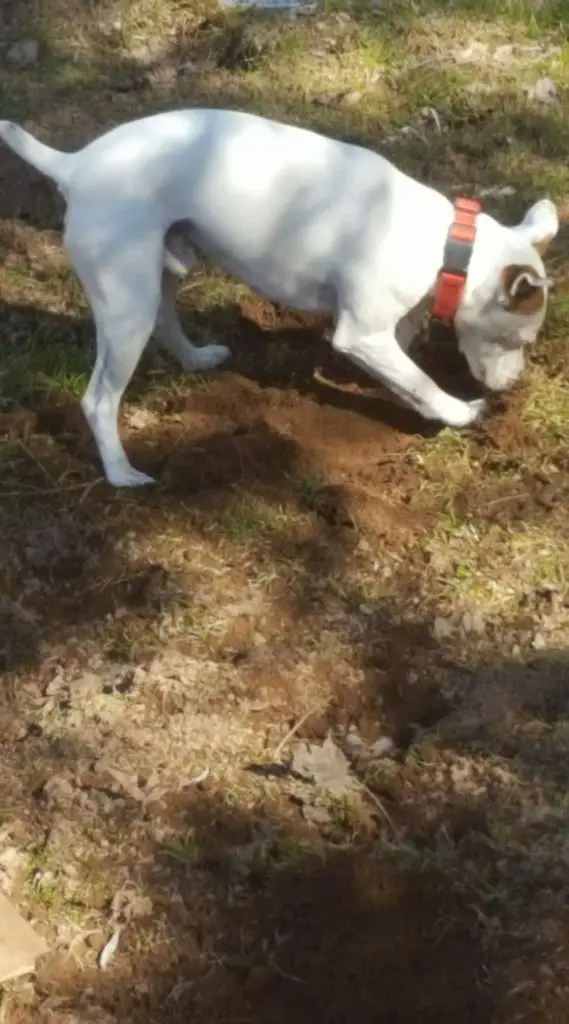
If you want to stop digging, you have two options. First, you can determine the root cause — boredom, anxiety, instinct — and deal with it.
Or, you could give it a job. That is, give your dog a safe place to dig that won’t disrupt your garden. Want to know how to build your own digging box for your dog? Check out this blogger’s innovative approach.
Barking
Barking like a maniac is another Jack Russell signature move. Plenty of Jacks bark a lot. In fact, one survey by Vet Street ranks the Jack Russell Terrier as the third most…err…talkative dog breed out there.
But why?
Like howling, barking is a behavior that wolves and dogs share. Unlike howling, though, barking is something only wolf pups do. Wolves eventually outgrow barking, but, lucky us, dogs continue to do it their entire lives.

If that’s not enough, dogs have different kinds of barking. But if you’ve ever really listened to your dog’s speech, you already know that. There are excited barks, angry barks, warning,
The Jack Russell
Does the barking make you barking mad? Do you wish you could open the door to the mail carrier without a
Don’t punish your dog for barking. It doesn’t work.

Shouting at them when
Instead, try to find the cause of the behavior.
If your dog barks from anxiety, try to provide loving, stable pack leadership. Also, increased exercise can help to take the edge
For excessive warning barking, training is in order. Issue a stern “stop” command, like “quiet!” or even a firm “good dog!” Then, when they are quiet, reward the quiet.
If your dog is barking from boredom or frustration, then more attention from you, exercise, and interaction with other dogs and family members can help.
Eating stool
It’s revolting. No two ways about it. Some dogs just love to get their face in the cat box and look for a snack. Or “clean up” after other dogs in the household. Or even eat their own.
It’s not as uncommon as you might think. About half of all dogs do it. And of that half, a bit more than fifty percent do it often.
But for the love of all things cute and fluffy, why?

Turns out, there are several different reasons your dog may enjoy eating…that.
If you live in a multi-dog household, and one of the other dogs is old, sick, or weak, a stronger dog may clean up after them. Instinct is telling the stronger dog that the weaker dog’s stool may attract predators. In your dog’s mind, they are protecting the household.
Some dogs are attracted to the residual flavors of meat-based cat and dog foods. They may even find it more attractive the second time around. Hey, waste not, want not, right?
Ew.
More seriously, though, stool-eating can be a sign of different illnesses, like diabetes, Cushing’s disease, thyroid problems, or parasites. So if your dog just started doing it, a trip to the vet can help to rule these problems out.

So, what can you do about it?
There are a few things.
First, limit your dog’s access to stool. Keep the cat’s litter box out of reach, and keep your dog’s areas free of feces.
You can also buy commercial products that make stool taste bad. You can also try changing their food to one that is less attractive on the way out.
It’s a dirty, disgusting habit, but if your dog does it, at least now you know why.
Destroying your stuff
Eat the shoes. Chew the couch. Go for Olympic gold in squeaker removal. Why do so many dogs seem to be so bent on chewing, clawing, biting, and ripping us out of house and home?
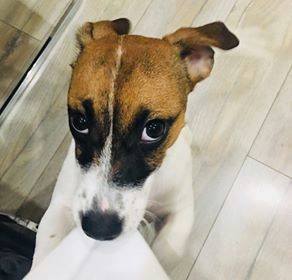
Chewing is a primal behavior. Just like with people, the action of chewing can be a way to manage stress or anxiety. A dog may chew things because he or she is upset, frustrated, or bored, as well.
And anyone who has ever owned a dog knows that revenge-chewing of Mom or Dad’s favorite shoes is a thing.
So what can you do about it?

The first line of defense is to protect your stuff. We child-proof our homes. Sometimes it’s necessary to dog-proof them as well. If your dog is an implement of destruction, make sure to keep your
A chew toy can help your dog to redirect that urge in a positive direction. Make sure to get something that’s durable and appropriate for your dog’s size. Food puzzle toys will alleviate the chewing urge, and boredom as well.

And speaking of boredom….
You, Jack Russell lover, already know what we’re going to say. When it comes to problem behaviors, exercise is almost always one of the keys to solving it.
A tired dog is a happy dog. And a happy dog is less likely to chew, dig, tear, and rip your favorite things to shreds.
Like so many problem behaviors, though, destructiveness can have roots in anxiety, especially separation anxiety. If you suspect anxiety to be at the core of your dog’s urge to destroy your home, then there are specific behavioral training techniques that can help your dog to feel better — and, ultimately, to leave your stuff alone.
Why Ask Why?
Our dogs’ behaviors can seem inexplicable at times. But if you look hard enough, there’s always a cause — even if it’s not immediately apparent. Understanding why our dogs do what they do can help us to appreciate the cute things more, and to eliminate problem behaviors before they get out of hand.
What unique thing has your dog done recently?
Featured Image: CC BY-SA 3.0 by Steve 65, via Wikimedia Commons

